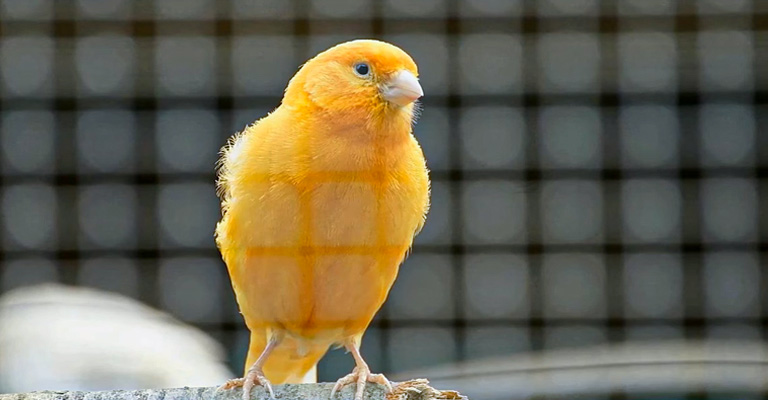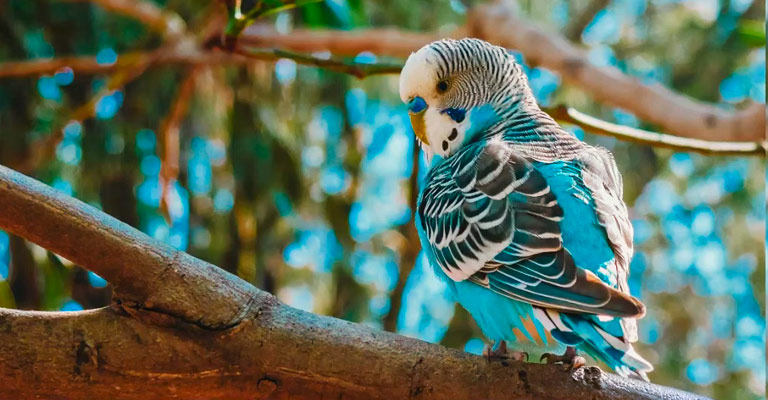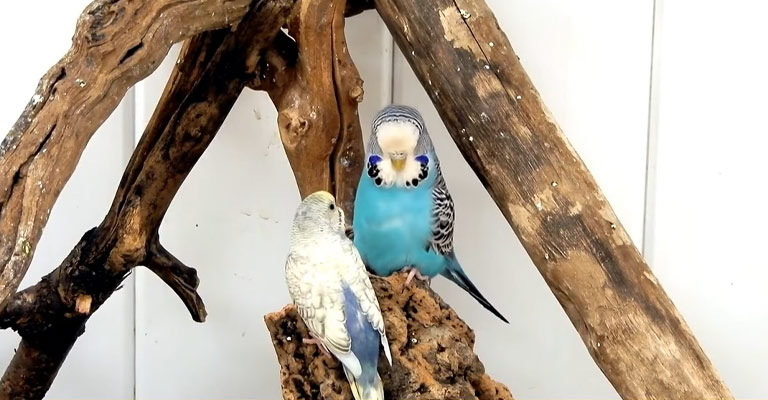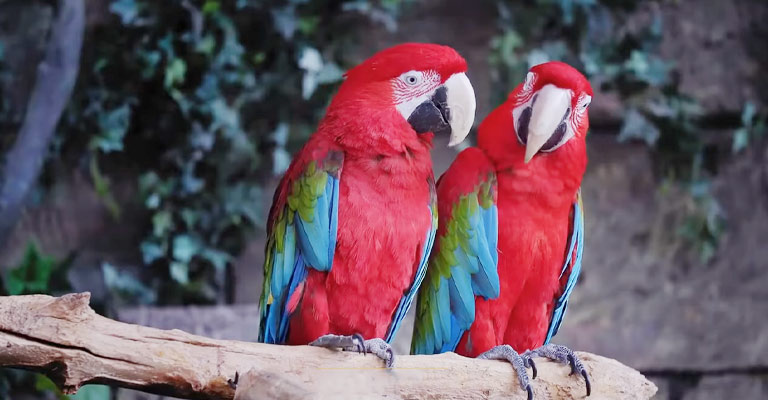The allure of having a bird as a pet has captivated humans for centuries. The vivid plumage, enchanting songs, and intelligence of these avian companions make them a unique choice for pet enthusiasts.
But the question lingers: Do birds make good pets? In this blog post, we will explore the various facets of bird ownership to help you make an informed decision.
Birds, ranging from vibrant parrots to melodious canaries, offer a diverse range of experiences for pet owners. However, with their charm come specific challenges and responsibilities, from long lifespans to social needs and potential noise levels.
Understanding these factors is essential to ensure a harmonious and rewarding relationship with your feathered friend.
So, whether you’re contemplating bringing home a pet bird for the first time or seeking to enhance your existing avian bond, read on to discover the world of avian companionship.

Do Birds Make Good Pets?
Birds can make good pets for the right individuals. They offer unique qualities such as colorful plumage, melodic singing, and intelligence. Birds are generally low maintenance compared to some other pets, requiring basic care like cage cleaning and feeding.
Their longevity can provide long-term companionship. Some species, like parrots, can form strong bonds and be affectionate. Birds also have therapeutic benefits, promoting relaxation and stress reduction.
However, birds are not ideal for everyone. They can be noisy, and messy, and may require a significant time commitment for social interaction and mental stimulation. Proper care, including nutrition and suitable housing, is crucial. Some species live for decades, necessitating a long-term commitment.
Additionally, it’s essential to consider local regulations and choose a bird species that aligns with your lifestyle and preferences. Ultimately, birds can make excellent pets, but potential owners should carefully evaluate their suitability for this unique responsibility.
Benefits of Owning a Pet Bird

Birds have been popular pets for centuries, and they continue to hold a unique appeal for many people. There are several reasons why birds are attractive as pets:
Beautiful Plumage
Birds come in a wide variety of colors and patterns, making them visually appealing. Species like parrots, canaries, and finches are known for their vibrant and striking plumage.
Melodic Singing
Many bird species are known for their melodious songs. Canaries and canary-like birds, for example, are celebrated for their beautiful and soothing songs. This makes them enjoyable companions, especially for those who appreciate music.
Low Maintenance
Compared to some other pets like dogs or cats, birds can be relatively low maintenance. They don’t require daily walks, and their housing needs are often simpler. Regular cleaning of cages and providing fresh food and water are the primary care tasks.
Social Interaction
Some bird species, particularly parrots, are highly social and can form strong bonds with their human owners. They can be affectionate, and playful, and enjoy interaction and attention.
Intelligence
Birds, especially parrots, are known for their intelligence. They can be trained to perform tricks, learn words, and even solve simple puzzles. This can make the interaction with them stimulating and enjoyable.
Longevity
Many bird species have relatively long lifespans compared to other pets. For example, some parrots can live for several decades with proper care, providing companionship for a significant portion of their owner’s life.
Aesthetic Appeal
Bird cages and aviaries can be beautiful additions to a home or garden. Some people appreciate the aesthetics of having a piece of nature in their living space.
Educational Value
Birds can be educational pets for both adults and children. Caring for a bird can teach responsibility, empathy, and an understanding of the natural world.
Therapeutic Benefits
The presence of birds can have a calming and soothing effect on people. Watching them fly, sing, or engage in their daily activities can reduce stress and promote relaxation.
It’s essential to note that owning a bird as a pet comes with responsibilities and challenges, including providing proper nutrition, social interaction, and a suitable environment.
Different bird species have different care requirements, so potential bird owners should research and choose a species that matches their lifestyle and preferences.
Additionally, keeping birds as pets may not be legal in all areas, so it’s crucial to check local regulations before acquiring a pet bird.
Challenges of Bird Ownership

Owning a bird as a pet can be a rewarding experience, but it also comes with its fair share of challenges and responsibilities. Here are some of the key challenges associated with bird ownership:
Longevity
Many bird species have long lifespans, often ranging from 10 to 80 years or more, depending on the species. This means that owning a bird is often a long-term commitment that may extend beyond the owner’s initial expectations or plans.
Social Interaction
Birds are highly social animals, and many species require daily interaction and mental stimulation to stay healthy and happy. Neglecting their need for companionship can lead to behavioral issues, such as feather plucking and excessive screaming.
Noise
Birds can be noisy, and some species, like parrots, are known for their loud calls and vocalizations. This can be disruptive to neighbors and may not be suitable for apartment living or close quarters.
Mess
Birds can be messy. They produce droppings, scatter food, and can molt feathers. Regular cleaning of cages and the surrounding area is necessary to maintain a clean and hygienic living environment.
Dietary Needs
Proper nutrition is vital for birds’ health. Different species have specific dietary requirements, and providing a balanced diet can be challenging. Fresh fruits, vegetables, pellets, and occasional treats may all be necessary to meet their nutritional needs.
Healthcare
Birds can hide signs of illness, making it challenging to detect health problems until they become severe. Routine vet visits are essential for preventive care and early detection of issues.
Cage Size and Enrichment
Birds need a sufficiently sized cage with plenty of toys and environmental enrichment to prevent boredom and ensure mental stimulation. Inadequate housing can lead to behavioral problems.
Legal and Ethical Considerations
Some bird species may be protected by laws and regulations, making it illegal to own them without the proper permits. Ethical concerns also surround the capture and trade of wild-caught birds.
Flight and Exercise
Birds need opportunities for flight and exercise. Wing-clipping, a common practice to prevent birds from flying, can be controversial as it limits their natural behavior.
Allergies
Bird feathers, dander, and dust can trigger allergies in some individuals, making bird ownership problematic for those with sensitivities.
Potential for Aggression
Some bird species, especially during mating seasons, can become territorial and aggressive. Proper training and socialization are essential to manage aggressive behavior.
Travel Restrictions
Owning a bird may limit your ability to travel, as finding suitable care for your pet can be challenging, and some countries have strict quarantine and import regulations for birds.
While owning a bird can be a fulfilling experience, it is not without its challenges. Prospective bird owners should carefully consider these challenges and their ability to meet the needs of their feathered friends before deciding to bring a bird into their lives.
Proper research, commitment, and responsible care are essential for providing a happy and healthy life for pet birds.
Choosing the Right Bird Is Essential

Choosing the right bird as a pet is a crucial decision that should be made carefully, as different bird species have varying needs, behaviors, and personalities.
Here are some steps to help you choose the right bird for your lifestyle and preferences:
Research
Begin by researching different bird species. Books, online resources, and talking to experienced bird owners or veterinarians can provide valuable insights into the characteristics of various birds. Consider factors such as size, lifespan, noise level, and care requirements.
Lifestyle Assessment
Evaluate your lifestyle and living situation. Some birds, like larger parrots, require a significant amount of daily interaction and mental stimulation, while others, like canaries, are more independent. Consider your daily routine, work hours, and available space for a birdcage.
Noise Level
Different bird species have different noise levels. If you live in an apartment or have close neighbors, you may want to choose a quieter species, such as budgerigars or canaries, rather than a loud and vocal parrot.
Size and Space
The size of the birdcage and the space available in your home will dictate the size of the bird you can accommodate. Larger birds like macaws and cockatoos require more extensive cages and more space to move around.
Allergies
Consider any allergies you or your family members may have. Bird feathers, dander, and dust can trigger allergies in some individuals, so it’s essential to choose a hypoallergenic species or take necessary precautions.
Longevity
Keep in mind that many birds have long lifespans. Be prepared for a long-term commitment, as some species can live for several decades. Consider what will happen to the bird if your circumstances change.
Personality
Different bird species have varying personalities. Some are highly social and affectionate, while others are more independent or even aloof. Think about the type of companionship you desire from your pet.
Training Potential
If you’re interested in teaching your bird tricks or having it talk, research species known for their intelligence and trainability, such as African Grey parrots or Cockatoos.
Availability and Legal Restrictions
Check local laws and regulations regarding bird ownership, as some species may be restricted or require permits. Also, consider the availability of the species you’re interested in; some rare birds may be challenging to find.
Adoption vs. Purchase
Consider adopting a bird from a rescue or shelter. Many birds are in need of loving homes. Adoption can also be more cost-effective than purchasing from a breeder or pet store.
Visit Breeders and Pet Stores
If you’re considering purchasing a bird, visit reputable breeders or pet stores to interact with different species. Spend time with the birds to get a feel for their personalities and see which one connects with you.
Consult a Veterinarian
Before making a final decision, consult a veterinarian with avian expertise. They can provide guidance on the specific care requirements and potential health issues associated with the species you’re interested in.
Remember that choosing the right bird is a long-term commitment, and it’s essential to select a species that matches your lifestyle, expectations, and ability to provide proper care.
Take your time in the decision-making process to ensure a happy and healthy relationship with your feathered companion.
How to Pet a Bird for the First Time?
Petting a bird for the first time requires a gentle and patient approach, as birds can be sensitive and easily startled. Here are steps to follow when petting a bird for the first time:
Observe and Gain Trust
- Spend some time near the bird’s cage without trying to touch it. Allow the bird to get used to your presence and observe your behavior.
- Talk to the bird in a calm and soothing tone to let it become familiar with your voice.
Respect Personal Space
- Approach the bird slowly and avoid sudden movements or loud noises that might startle it.
- Allow the bird to come to you on its terms. Extend your hand slowly and gently towards it, but do not force contact.
Offer Treats
- Birds often respond positively to food. Offer a small treat like a piece of millet, a slice of fruit, or a nut, holding it between your fingers.
- Let the bird approach your hand to take the treat. This can help build a positive association with your presence.
Use a Perch or a Stick
- Instead of trying to pet the bird with your hand initially, use a small handheld perch or stick. Allow the bird to step onto it voluntarily.
- Once the bird is comfortable perching on the stick, you can slowly introduce gentle touches.
Watch Body Language
- Pay close attention to the bird’s body language. If it appears anxious, fluffs its feathers, or moves away from you, give it space and time to relax.
- Birds often enjoy being petted on their head or neck, but individual preferences may vary.
Start with Light Touches
- When the bird seems relaxed and comfortable with your presence, try gently stroking its head or neck with your finger.
- Use slow, soft, and deliberate motions. Avoid sudden or rough touches that may frighten the bird.
Continue Building Trust
- Be consistent in your interactions. Spend time with the bird regularly to strengthen the bond and trust between you.
- Always be patient and respect the bird’s boundaries. Not all birds will enjoy being touched, so it’s crucial to gauge their comfort level.
Positive Reinforcement
- Offer verbal praise or another small treat when the bird allows you to pet it. This reinforces the positive experience.
Respect Body Language
- Continue to watch the bird’s body language as you pet it. If it shows signs of discomfort or stress, stop petting immediately and give it space.
Gradually Increase Interaction
- As the bird becomes more comfortable with your touch, you can increase the duration and frequency of your interactions.
Remember that not all birds will enjoy being petted, and individual preferences vary. It’s essential to be patient and respectful of the bird’s boundaries. Building trust and a positive relationship takes time, so go at the bird’s pace and allow it to dictate the level of interaction it’s comfortable with.
FAQs
Birds can be suitable for busy individuals if you choose a low-maintenance species. Finches or canaries require less interaction than parrots. However, all birds need daily care, social interaction, and mental stimulation.
The space requirement depends on the bird’s size. Smaller birds like budgerigars can thrive in a relatively small cage, while larger species like macaws need more significant enclosures and space to fly outside the cage.
Birds can be suitable for families with well-supervised children. However, children should be taught to handle birds gently and respect their boundaries. Some bird species, like budgerigars, can be more forgiving with kids.
Not all birds talk, but species like African Grey parrots and some Amazon parrots are known for their talking abilities. Teaching a bird to talk requires patience and consistent training. Not all birds will develop the skill, and individual aptitude varies.
Birds should not be left alone for long periods regularly. They require daily attention, social interaction, and mental stimulation. If you need to be away, arrange for a caregiver or provide enrichment toys to keep them engaged in your absence.
Wrapping Up
Birds can indeed make wonderful pets for those who are willing to invest time, patience, and care into their well-being. Their unique characteristics, from stunning beauty to heartwarming songs, can offer a deep sense of joy and companionship.
However, it’s crucial to remember that bird ownership comes with responsibilities and challenges, including providing the right environment, social interaction, and proper healthcare.
By thoroughly considering your lifestyle and preferences and researching the specific needs of your chosen bird species, you can embark on a fulfilling journey with these feathered friends.
Ultimately, the decision to bring a bird into your life should be made with careful consideration and a genuine commitment to providing the best possible care for your avian companion.